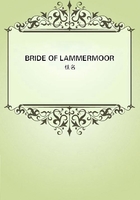
第140章
In the mean while, Lady Ashton, her husband, and their assistants in vain sought Lucy in the bridal bed and in the chamber. There was no private passage from the room, and they began to think that she must have thrown herself from the window, when one of the company, holding his torch lower than the rest, discovered something white in the corner of the great old-fashioned chimney of the apartment. Here they found the unfortunate girl seated, or rather couched like a hare upon its form--her head-gear dishevelled, her night-clothes torn and dabbled with blood, her eyes glazed, and her features convulsed into a wild paroxysm of insanity. When she saw herself discovered, she gibbered, made mouths, and pointed at them with her bloody fingers, with the frantic gestures of an exulting demoniac.
Female assistance was now hastily summoned; the unhappy bride was overpowered, not without the use of some force. As they carried her over the threshold, she looked down, and uttered the only articulate words that she had yet spoken, saying, with a sort of grinning exultation, "So, you have ta'en up your bonny bridegroom?" She was, by the shuddering assistants, conveyed to another and more retired apartment, where she was secured as her situation required, and closely watched.
The unutterable agony of the parents, the horror and confusion of all who were in the castle, the fury of contending passions between the friends of the different parties--passions augmented by previous intemperance--surpass description.
The surgeon was the first who obtained something like a patient hearing; he pronounced that the wound of Bucklaw, though severe and dangerous, was by no means fatal, but might readily be rendered so by disturbance and hasty removal. This silenced the numerous party of Bucklaw's friends, who had previously insisted that he should, at all rates, be transported from the castle to the nearest of their houses. They still demanded, however, that, in consideration of what had happened, four of their number should remain to watch over the sick-bed of their friend, and that a suitable number of their domestics, well armed, should also remain in the castle. This condition being acceded to on the part of Colonel Ashton and his father, the rest of the bridegroom's friends left the castle, notwithstanding the hour and the darkness of the night. The cares of the medical man were next employed in behalf of Miss Ashton, whom he pronounced to be in a very dangerous state. Farther medical assistance was immediately summoned. All night she remained delirious. On the morning, she fell into a state of absolute insensibility. The next evening, the physicians said, would be the crisis of her malady. It proved so; for although she awoke from her trance with some appearance of calmness, and suffered her night-clothes to be changed, or put in order, yet so soon as she put her hand to her neck, as if to search for the for the fatal flue ribbon, a tide of recollections seemed to rush upon her, which her mind and body were alike incapable of bearing. Convulsion followed convulsion, till they closed in death, without her being able to utter a word explanatory of the fatal scene.
The provincial judge of the district arrived the day after the young lady had expired, and executed, though with all possible delicacy to the afflicted family, the painful duty of inquiring into this fatal transaction. But there occurred nothing to explain the general hypothesis that the bride, in a sudden fit of insanity, had stabbed the bridegroom at the threshold of the apartment. The fatal weapon was found in the chamber smeared with blood. It was the same piniard which Henry should have worn on the widding-day, and the unhappy sister had probably contrived to secrete on the preceding evening, when it had been shown to her among other articles of preparation for the wedding.
The friends of Bucklaw expected that on his recovery he would throw some light upon this dark story, and eagerly pressed him with inquiries, which for some time he evaded under pretext of weakness. When, however, he had been transported to his own house, and was considered in a state of convalescence, he assembled those persons, both male and female, who had considered themselves as entitled to press him on this subject, and returned them thanks for the interest they had exhibited in his behalf, and their offers of adherence and support. "I wish you all," he said, "my friends, to understand, however, that I have neither story to tell nor injuries to avenge. If a lady shall question me henceforward upon the incident of that unhappy night, I shall remain silent, and in future consider her as one who has shown herself desirous to break of her friendship with me; in a word, Iwill never speak to her again. But if a gentleman shall ask me the same question, I shall regard the incivility as equivalent to an invitation to meet him in the Duke's Walk, and I expect that he will rule himself accordingly."A declaration so decisive admitted no commentary; and it was soon after seen that Bucklaw had arisen from the bed of sickness a sadder and a wiser man than he had hitherto shown himself. He dismissed Craigengelt from his society, but not without such a provision as, if well employed, might secure him against indigence and against temptation.
Bucklaw afterwards went abroad, and never returned to Scotland;nor was he known ever to hint at the circumstances attending his fatal marriage. By many readers this may be deemed overstrained, romantic, and composed by the wild imagination of an author desirous of gratifying the popular appetite for the horrible; but those who are read in the private family history of Scotland during the period in which the scene is laid, will readily discover, through the disguise of borrowed names and added incidents, the leading particulars of AN OWER TRUE TALE.